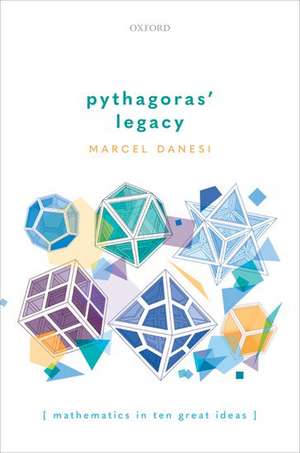Pythagoras' Legacy: Mathematics in Ten Great Ideas
Autor Marcel Danesien Limba Engleză Hardback – 3 feb 2020
Preț: 244.40 lei
Nou
Puncte Express: 367
Preț estimativ în valută:
46.78€ • 50.83$ • 39.32£
46.78€ • 50.83$ • 39.32£
Carte tipărită la comandă
Livrare economică 10-16 aprilie
Preluare comenzi: 021 569.72.76
Specificații
ISBN-13: 9780198852247
ISBN-10: 019885224X
Pagini: 182
Dimensiuni: 161 x 233 x 16 mm
Greutate: 0.48 kg
Editura: OUP OXFORD
Colecția OUP Oxford
Locul publicării:Oxford, United Kingdom
ISBN-10: 019885224X
Pagini: 182
Dimensiuni: 161 x 233 x 16 mm
Greutate: 0.48 kg
Editura: OUP OXFORD
Colecția OUP Oxford
Locul publicării:Oxford, United Kingdom
Recenzii
A pleasant read, with a number of interesting asides
...this book is a good one.
Marcel Danesi's depth and breadth of knowledge of the history of mathematics, his innate narrative talent, and his uncanny knack for explaining complex notions in simple terms make this book about mathematical notions a true delight to read
Pythagoras' legacy certainly is a gentle introduction to some paramount ideas of mathematics and can be considered as an appetizer for the reader eager to learn a bit more about one of the greatest endeavors of humanity: Mathematics. It is recommended reading for curious people without mathematical background and also for those professional mathematicians who love enjoying a pleasurable book on the science they are passionate about.
...this book is a good one.
Marcel Danesi's depth and breadth of knowledge of the history of mathematics, his innate narrative talent, and his uncanny knack for explaining complex notions in simple terms make this book about mathematical notions a true delight to read
Pythagoras' legacy certainly is a gentle introduction to some paramount ideas of mathematics and can be considered as an appetizer for the reader eager to learn a bit more about one of the greatest endeavors of humanity: Mathematics. It is recommended reading for curious people without mathematical background and also for those professional mathematicians who love enjoying a pleasurable book on the science they are passionate about.
Notă biografică
Marcel Danesi is Full Professor of Linguistic Anthropology at the University of Toronto and a Co-Director of the Cognitive Science Network of the Fields Institute of Mathematical Research. He has published extensively in the field of mathematical cognition and in the theory of mathematical puzzles. He also writes a blog for Psychology Today that explore the nature of the puzzling mind.
